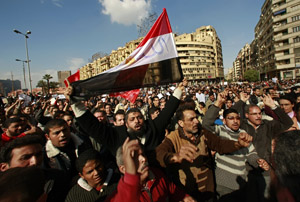
By: MARK VAGELAKOS
For the past week, Egyptian citizens gathered in Cairo by the hundreds of thousands to show their opposition to the government, specifically President Hosni Mubarak. Protesters vow not to stop until Mubarak resigns.
“Egypt is in the midst of a defining moment, both in its history and the history of the world. Hopefully, democracy will retain its influence in Egypt,” junior Charles Collins said.
The oppositionists poured into Tahrir Square chanting their demands for the removal of Mubarak and the end of an era of civil rights violation. The death toll of Egyptian protesters is over 300.
“I think [the protests] were really inevitable. People can only be living in circumstances of social and political unrest for so long,” junior Sehar Noor said.
Accordingly, Egyptian activists cite corruption, restriction of freedom of speech and press, as well as secret police that jail thousands of political prisoners as inspirations for protest. Additionally, rising food prices and neighboring Tunisia’s recent overthrow of their leader, Zine El-Abidine Ben Ali, have contributed to the conflict.
“Protesters certainly have the right to protest Mubarak’s administration. It is a basic human right to protect a perceived wrong and the size of the movement suggests some truth exists to the Egyptians claims,” Collins said.
Initially, Mubarak responded to demonstrators by unleashing the notorious secret task force armed with tear gas. The force also arrested hundreds of protesters but when this action did not quell the tide of dissenters, Mubarak dispatched the military into the crowd to keep order, equipped with tanks and weapons.
Making another attempt to please the gathered masses, Mubarak called in an entirely new cabinet but the action left protestors unchanged. One of the only notable departures was Interior Minister Habib al-Adly, who organized the infamous secret police force that has been accused of systematic human rights violations, according to Al Jazeera. Additionally, the Egyptian government has made numerous unsuccessful attempts to block the spread of footage and news of protests by restricting Internet and cell phone towers.
All of these preventative actions have been in vain, as international attention grows daily.
President Mubarak has been a key figure in the Peace in the Middle East campaign, as well as a ruthless suppressor of jihadists in Egypt. This puts the United States, who largely funds the Egyptian military, in a tough situation.
In a BBC article, United States Secretary of State Hillary Clinton said the Egyptian government was “stable and looking for ways to respond to the legitimate needs and interests of the Egyptian people.”
However the oval office has changed their view on the situation since.
“An orderly transition to a government that is responsive to the aspirations of the
Egyptian people [is needed],” President Barack Obama said.
If demonstrators are successful in their removal of Mubarak, it is unknown who would fill the power vacuum.
“The worst thing would be for the protests to get more violent without results. If Mubarak steps down and no one adequate is there to replace him, there would be a power void which would lead to even more corruption and chaos,” Noor said.
Many believe the moderate traditional group the Muslim Brotherhood will take power but they have not firmly chosen a leader to step in. The replacement will more likely be former head of the UN nuclear agency Mohamed ElBaradei, a Nobel Peace Prize laureate, who has been a leader in opposition groups. ElBaradei’s views include transparent elections, democratic rule, freedom of press, and a constitution that does not prevent religious minorities from running for Egypt’s highest political office, all of which are popular with the Egyptian people.
“The best outcome in the Egypt situation would be for a pro-democratic and civil rights government to emerge from the shambles. Whether or not that government is headed by President Mubarak is up to the citizens and voters of Egypt. Egypt’s geographic location is critical to the US and our allegiance will hopefully continue,” Collins said.
After eight days of protest, President Mubarak released a statement that he will not run for re-election but refuses to step down. His term ends this year.
To see footage from the protests in Tahrir square go to
http://www.youtube.com/watch?v=vZO-Zr3gqg8